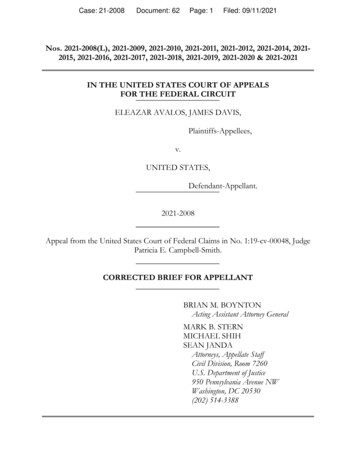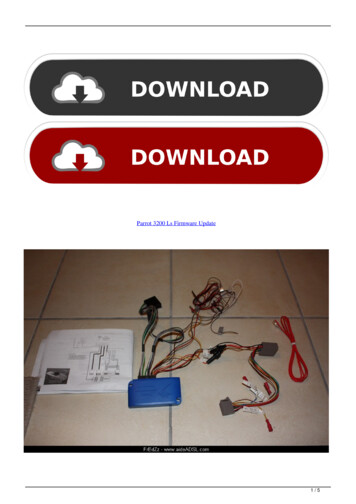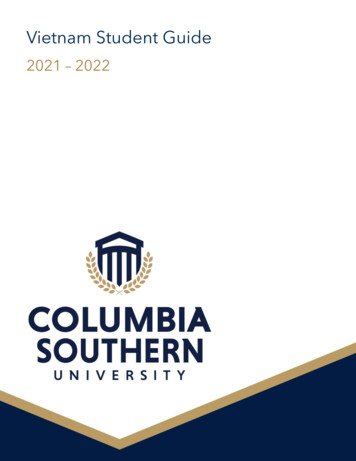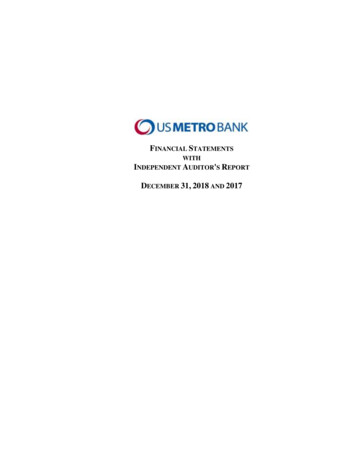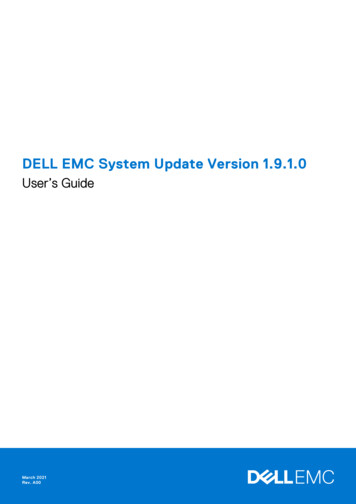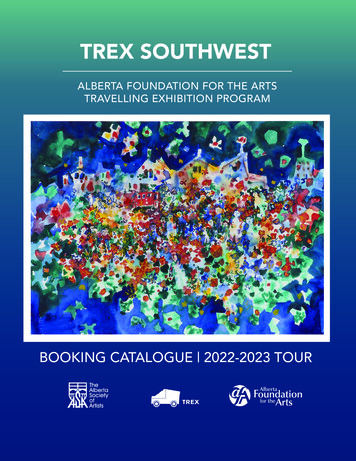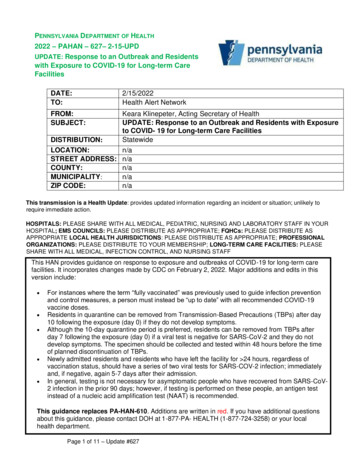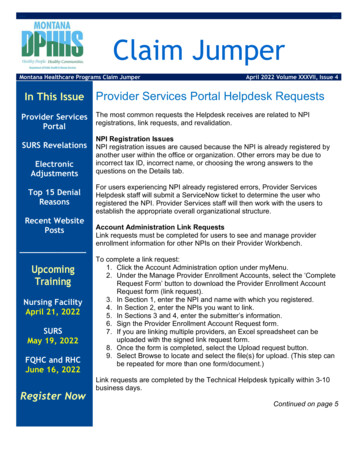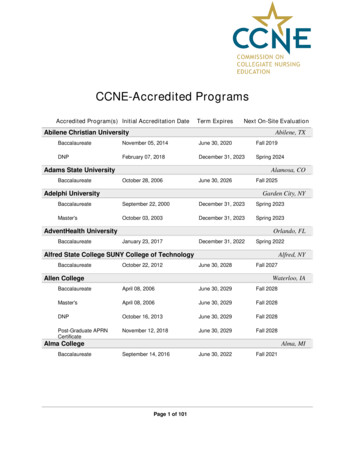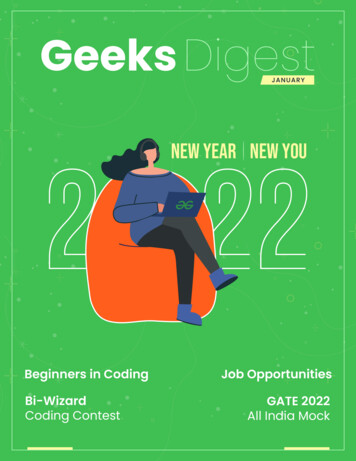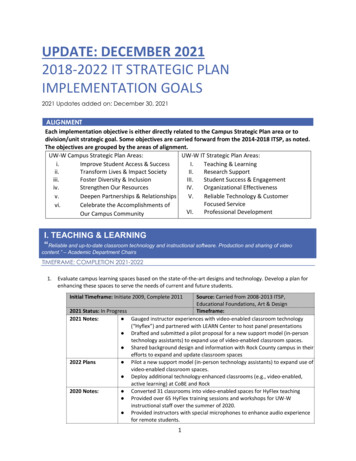
Transcription
UPDATE: DECEMBER 20212018-2022 IT STRATEGIC PLANIMPLEMENTATION GOALS2021 Updates added on: December 30, 2021ALIGNMENTEach implementation objective is either directly related to the Campus Strategic Plan area or todivision/unit strategic goal. Some objectives are carried forward from the 2014-2018 ITSP, as noted.The objectives are grouped by the areas of alignment.UW-W Campus Strategic Plan Areas:UW-W IT Strategic Plan Areas:i.Improve Student Access & SuccessI.Teaching & Learningii.Transform Lives & Impact SocietyII.Research Supportiii.Foster Diversity & InclusionIII.Student Success & Engagementiv.Strengthen Our ResourcesIV.Organizational EffectivenessV.Reliable Technology & Customerv.Deepen Partnerships & RelationshipsFocused Servicevi.Celebrate the Accomplishments ofVI.Professional DevelopmentOur Campus CommunityI. TEACHING & LEARNING“Reliable and up-to-date classroom technology and instructional software. Production and sharing of videocontent.” – Academic Department ChairsTIMEFRAME: COMPLETION 2021-20221.Evaluate campus learning spaces based on the state-of-the-art designs and technology. Develop a plan forenhancing these spaces to serve the needs of current and future students.Initial Timeframe: Initiate 2009, Complete 2011Source: Carried from 2008-2013 ITSP,Educational Foundations, Art & Design2021 Status: In ProgressTimeframe:2021 Notes: Gauged instructor experiences with video-enabled classroom technology(“Hyflex”) and partnered with LEARN Center to host panel presentations Drafted and submitted a pilot proposal for a new support model (in-persontechnology assistants) to expand use of video-enabled classroom spaces. Shared background design and information with Rock County campus in theirefforts to expand and update classroom spaces2022 Plans Pilot a new support model (in-person technology assistants) to expand use ofvideo-enabled classroom spaces. Deploy additional technology-enhanced classrooms (e.g., video-enabled,active learning) at CoBE and Rock2020 Notes: Converted 31 classrooms into video-enabled spaces for HyFlex teaching Provided over 65 HyFlex training sessions and workshops for UW-Winstructional staff over the summer of 2020. Provided instructors with special microphones to enhance audio experiencefor remote students.1
2021 Plans: Assess use of video-enabled classrooms, introduce improvements as needed.2019 Notes: 2018 Notes: 2019 Plans: 2017 Notes: Infused active learning design and pedagogy into current IT classroomredesign processes.Offered the Active Learning Academy during the Summer-Fall 2018 toprepare instructors new to teaching in Heide 102, 105 (and McGraw 19A)the opportunity to explore active learning best practices and teachingmethods in regards to pedagogy, technology, and space. Work continuedinto Fall 2018, with instructor observations, 1x1 consultations with LTCstaff, and focus group meetings to share effective teaching practices.Work with departments to understand teaching needs and aligning state-ofthe-art designs and technology to support student learning and successFacilitated the Provost’s Classroom Redesign Initiative, working with a teamof instructors from the College of Letters and Science as a strategic partner.Designed the Active Learning Academy to assist instructors teaching in theredesigned spaces in understanding how technology, furniture, and spacesupports an active learning pedagogy. Developed evaluation mechanisms tounderstand the effectiveness of the room design.Collected data from instructors using McGraw 101, a large lecture space,which informed the ISPR submission in hopes of funding for futureredesign to better meet needs of instructors and students.Work with the College of Letters and Science to complete the redesign ofHeide 105 and enhance instructional development opportunities to meetinstructor needs, supporting them in leveraging technology, pedagogy, andspace in the redesigned classrooms.Completed 24 classroom digital upgrade projects during the 2016 calendaryear. The upgraded classroom features fully digital A/V technology andplaced on 8- year replacement cycle.The UW-Whitewater Classroom Technology Upgrade Plan (AV multi-yearupgrade strategy) was approved and funded for years one and two. Beganimplementing phase one the UW-Whitewater Classroom TechnologyUpgrade Plan. 25 campus classrooms were upgraded and/or converted todigital classroom technology and placed on an 8-year replacement cycle.Will seek permanent funding allocation to ensure sustainability of campusA/V technology. At least 17 classrooms expected to be upgraded to fullydigital A/V technology and placed on 8-year replacement cycle.Campus A/V technology standards were defined and implemented. Acomprehensive campus-wide audio/visual inventory and review wascompleted. The findings served as a basis for the multi-year campus AVupgrade strategy. Plan was developed, presented for approval and funding.Begin implementing new campus-wide AV improvement plan, includinganalog to digital migration. 2018 Plans: 2016 Notes: 2015 Notes: 2016 Plans: 2014 Notes: 2015 Plans: 2. Process reengineering for online course evaluation system.Initial Timeframe: Started in 2018Source: ICIT2021 Status: In ProgressTimeframe: Complete in 20212021 Notes: LTC Director joined CEAG as co-Director (with Kevin B.) to support and improvecourse evaluation participation rates Worked with governance groups to start identifying strategies to improvevalue of course evaluations to review teaching efficacy2022 Plans Evaluate new course survey options and present information to campusstakeholders (e.g., deans, departments, governance groups)2
2020 Notes:2021 Plans:2019 Notes:2020 Plans:2018 Notes:2019 Plan:2018 Plan:3.Updated the Class Climate software to the most current version - 8.0. This updatebrought additional functionality to the data upload process as well as repaired anongoing issue with the email delivery service. It also kept the software current in itssupport from Scantron Corp. ICIT staff built the necessary integration between theWINS system and Class Climate.Online evaluations will continue to be managed through Class Climate, though UWSystem is in the process of analyzing other options for course evaluations. UWWhitewater is part of this project, and will work with other campuses to considerthe feasibility of other solutions.Explored feasibility of developing an integrated approach to leveraging a suite oftools to meet UW-W assessment/accreditation, learning outcomes, and courseevaluation needs. Questions regarding culture readiness and funding werepresented for digital transformation of assessment/accreditation planning andlearning outcomes (i.e., ePortfolios). Thus, ICIT moved forward and met withvendors to explore products that would better suit UW-W’s needs for onlinecourse evaluation.Review recommendations from the ICIT course evaluation team and determinefeasibility of tool transition.Reviewed market to better understand availability of online evaluation tools thatwould make our course evaluation process more effective.Assess the campus interest in pursuing a suite of tools from Watermark tostreamline assessment & accreditation planning, learning outcomes measurement,ePortfolios & Student Assessment, and online course evaluations.Conduct market analysis to identify a more flexible and intuitive tool that willmake the course evaluation process more effective and speed up the serverreporting process.Enable “anywhere” access to campus resources.Initial Timeframe: Start in 2011Source: Carried from 2008-2013 ITSP2021 Status: In ProgressTimeframe: Complete in 20222021 Notes: Replaced RDP access with Citrix Remote PC, disabled RDP protocol. Virtualize additional business applications such PrismRBS for Bookstore. Deployed new VPN equipment to allow posture checking Pilot posture checking on VPN with ICIT. Developed and presented to Executive Tier a proposal to enhance remoteaccess security posture (AV checking and MFA)2022 Plans Roll-out posture checking on VPN campus-wide Require MFA for VPN remote access2020 Notes: Expanded the Citrix Virtual Apps Library to include Adobe Creative Cloud apps. Added server capacity and virtualized additional instructional software, such as Microsoft Office Suite 2019 Adobe Creative Cloud Suite 2020 Design Applications -Maya 2020 -Mudbox 2020-Rhino 6-Vectorworks 2020Statistics-SPSS Modeler 18-SPSS Statistics 27-STATA 16-Matlab 20203
2021 Plans:2019 Notes:2018 Notes:2019 Plans:2017 Notes:2018 Plans:2016 Notes:2017 Plans:4.Music Applications -Finale -Max 8 -Rack -Reason 11 -Sibelius Enabled remote access to graphic-intensive instructional software for twoacademic programs (Geography and MAGD) by using Citrix Remote PC solution. Virtualized Peachtree software for financial services. Piloted Citrix remote PC solution for users who need to remote into theirdesktops as part of their work. Complete transition to off campus computer access to Citrix Remote PC, disableRDP protocol. Enable MFA for access to network storage. Virtualize additional business applications such PrismRBS for Bookstore.Virtualized commonly used Adobe Creative Cloud Applications. Beginvirtualizing certain departmental applications (such as Sage 50 Accounting)Working through Adobe licensing issues to offer Creative Cloud Suite as a virtualapplication. Added additional virtualized apps to the current environment.Add apps to the virtual environment including the Adobe Creative Cloud Suite.Implemented Citrix VDI and Application Virtualization Pilots GA Lab software is now available to students thru Citrix VDI Virtualized software applications such as SPSS, MS Office, MatLab andCaseware Idea. Engaged with faculty who teach using theseapplications to test and transition from existing VMWare VDIenvironment. Review and select a new thin-client or zero-client technology. Work through issues with new Adobe licensing to offer Creative Cloudvirtual applications. Evaluated the roadmap for current VDI solution and whether itsfunctionality aligns with long term needs of UW-Whitewater. Assessedcompetitor solution to VMWare, Citrix. Finalized contract, and initiated testing and rollout for Kumo cloud storagedrive mapping solution, which will enable simplified access to cloud storagefrom a campus-owned computer. Will conduct full evaluation of Citrix product and pilots as needed. Implement and rollout Kumo to campus community.Re-assess the approach to instructional technology training.Initial Timeframe: Start in 2021Source: ICIT/LTC2021 Status: NewTimeframe:2021 Notes: Conducted comprehensive survey on instructional needs and preferences Solicited feedback from Advisory Group with an emphasis on promotingparticipation in training events and identifying new service areas Explored design and functionality of an on-demand training resource library2022 Plans: Develop and populate an “On-demand resource library” to offerfaculty/instructional guided demonstration of deeper pedagogicalapplication and integration of academic technologies and instructional designpractices. Conduct comprehensive campus-wide survey on technology needs, skills, andpreferences for future support (e.g., new skill- or tool-based workshops).4
2021 Plans: Promote and gauge response to LTC consultation services (individual,department-specific, etc.).Continue to model hybrid workshop/event best practices with video-enabledclassroom and meeting space technologies.Focus on enabling instructors to use tools effectively to achieve desiredpedagogical outcomes.Conduct surveys / focus groups to identify specific professional developmentneeds and structure LTC offerings to address them.ONGOING1.Institute is a program to cultivate campus-wide awareness of emerging technologies throughdemonstrations, seminars and workshops, capitalizing on the knowledge and expertise of our faculty,staff, and students from across campus.Initial Timeframe: Initiate in 2009Source: Carried from 2008-2013 ITSP, CLS2021 Notes: Continued to offer programs to support emerging technologies, such asGoogle Apps and Webex Meetings Developed new programs geared toward “Next-Level” technologyenhanced instruction with a focus on discrete instructional designmethodologies and practices (e.g., interactive multimedia and assessment,advanced modular design, and “chunking”, etc.) Developed discussion series for Spring 2022 around EDUCAUSE Top-10 ITIssues Conducted sustained awareness campaign centered on LinkedIn Learningonline course materials; paired with workshop on instructional use cases Partnered with Prof. Meg Waraczynski to explore a Community of Practice/User Group for Realizeit users on campus (on calendar for February 2022)2020 Notes: In the Summer of 2020, LTC applied for a UW System Online LearningInitiative grant and received 111,000, mostly to fund stipends forinstructors. The proposal was developed to support Scaling up SummerTraining in Online Teaching and Learning. The LTC provided workshops and training for the HyFlex instruction model,Webex Meetings, and remote teaching best practices. The LTC collaborated with LEARN to offer a Summer InstructionalDevelopment Webex Series to facilitate remote teaching and learning. Completed the six-part, year-long workshop series with LEARN focused onhumanizing courses and connecting with students to increase learning,retention, and success. Offered application-specific training via vendor workshops including PollEverywhere, GooseChase, and LinkedIn Learning. Hosted a week-long virtual Technology Open House for all UW-Wstudents, faculty and staff. This event provided attendees withinformation on the latest technology initiatives, services and resources. Sent out a monthly Connect IT newsletter to faculty and staff on the latesttechnology news, updates and events. Hosted a New Year LinkedIn Learning Challenge for students and staffdesigned to help improve teaching, learning and working habits throughLinkedIn Learning Courses. Ran quarterly raffle-prizes contests for staff and students in order tohighlight specific technology tools and services. Promoted IT services, resources and events through email campaigns and5
2019 Notes: 2018 Notes: social media platforms targeting both students and staff.Began facilitation of a six-part, year-long workshop series with LEARNfocused on humanizing courses and connecting with students to increaselearning, retention, and success.Added a faculty co-facilitator, to bring additional perspective, to theInstitute for Online and Blended Teaching.Partnered with the Graduate School to offer workshops to supportinstructors new to developing programs and teaching graduate coursesonline, opportunities to leverage technology to enhance content,activities, and connections with students.Continued and deepened use of Cerego to further explore impact ofadaptive learning and distributive practice to better support studentsuccess with campus instructors from varying disciplines.Began planning the third Celebrating Teaching and Learning Conference,extending partnership beyond LEARN to the Office of AcademicAssessment.Began work with LEARN and the Office of Academic Assessment on a onestop shop website for instructional staff to find resources to enhance theirteaching and student learning.Provided workshops to assist with the transition and advancement of theuse of Canvas.Began facilitating a six-part, yearlong workshop series with LEARN focusedon assisting instructors to get back to basics by managing their workload.Under the Emerging Technology Exploration Project program, ran projectsfor collaborative tools (Webex Teams, PollEverywhere, Turningpoint8) inSpring 2018 and adaptive learning (Cerego and Realizeit) during Summerand Fall 2018.Continued discussing the Virtual Teaching Commons with campus partners.Offered Introductions to Canvas, Construction Zones, and Deep Dives intospecific Canvas tools to support the transition from D2L to Canvas. To meetinstructor needs, sessions were face-to-face with remote participation asneeded. Additionally, a self-paced online resource was developed. The LTCutilized a peer mentor approach for the D2L-Canvas transition, whereinstructors became early adopters and helped their colleagues transitionthrough office hours, recording video help tutorials, and facilitating campusand college Canvas events.Offered Webex Team Bootcamps for instructors interested in using it.Offered PollEverywhere workshops for instructors who may want to usethe tool to increase student engagement in face-to-face courses.Began preparing for the 2nd Celebrating Teaching and Learning Conference(May 2019), where instructors will share their expertise and teachingstrategies.6
2017 Notes: 2016 Notes: Facilitated three-part workshop series with LEARN (i.e., Spring 2017focused on facilitated discussions, fall 2018 focused on studentengagement). The second part of each series featured instructors from thecampus sharing their strategies (i.e., four instructors discussed how theyfacilitate discussions, four instructors shared the strategies they used forstudent engagement). The third part of each series had a specific focus onintegrating technology to solve pedagogical challenges in teaching andlearning (i.e., using online discussions in the LMS to facilitate deeperengagement around difficult topics, using software to engage students).Under the Emerging Technology Exploration Project program, included ranprojects for Study Pattern (Spring 2017) and Cisco Spark (Fall 2018). Eachsemester instructors explored a tool that meets a chosen pedagogicalchallenge. Instructors submitted proposals to be included in the project,those who were selected participate in instructional development sessions,implemented the tool into their course, assisted in evaluating whether itaddressed their specific pedagogical challenge, and provided a videotestimonial that discusses how they used it, giving advice to potentialfuture instructor users of the tool.Explores the Virtual Teaching Commons idea with campus partners.Provide demonstrations and workshops for D2L to Canvas transitionCollaborations with LEARN to provide workshops to the instructorsthat leverage knowledge/expertise of campus instructors.Explored feasibility of Virtual Teaching Commons, focusing on gatheringand sharing information related to online and blended learning.Additional UWW partners included community-based learning, academicinnovation, LEARN), as well as a cross-institutional partnership withUWM to share materials.In the Spring 2016 and Fall 2016 semesters facilitate the expansion of theCommunity of Practice by holding meetings that enabled participants toask questions and learn about a specific topic.Conducted Summer and Winter Institutes for Online / Blended Teaching,with a total of 28 participants between both offerings.Created more than 20 videos of Online/Blended alumni sharingknowledge gained through the Online/Blended workshops.Reworked the Technology Training and Advocate position after aresignation to focus on Technology proficiency, promotion, and adoption.This position will be hired in 2017.Stackable series for Fall 2016 focused on Active Learning and is incollaboration with LEARN.Distributed instructor support survey in April 2016. 109 instructional staff(of 653 recipients) responded to the survey for a 17 percent response rate.Created a Fall 2016 marketing campaign to introduce new staff,upcoming events, and new/underutilized technologies. Promotedthrough announcements and as a news item on the D2L home page.7
2015 Notes: 2016 Plans: 2014 Notes: 2015 Plans: 2013 Notes: 2014 Plans: 2012 Notes: 2013 Plans: Successfully launched Community of Practice of Online/Blended Teaching inthe spring of 2015. Held meetings twice per semester where participantsshared their expertise related to online/blended teaching. Expandedparticipation to include library staff in an effort to educate faculty oneducational technology resources offered by the UW-Whitewater library.Continued Stackable focusing on a specific teaching challenges: ePortfolio.Conducted pilots of Canvas system beginning in the spring of 2015.Collected feedback from instructors involved in the pilot.Coursesmart: Facilitated D2L integration for VitalSource eTextbook system,in collaboration with UW-Whitewater bookstore.Focus on expansion of Community of Practice by recruiting additionalmembers, evaluate effectiveness. Explore the creation Virtual TeachingCommons where instructors can share expertise – digitally – as it relates toonline/blended teaching. Will create a video series of Online/Blendedalumni sharing knowledge gained through the Online/Blended workshops.Continued Snackables with a focus on teaching challengesSLA for VitalSource etextbook system supportWill distribute survey to faculty and instructional staff to explore need foremerging technologies. Promote other underutilized technologiesDeveloped a proposal and a framework for community of practice foronline/blended teaching, which is meant to be a forum for UW-Whitewaterinstructors to develop, share, and document best-practices in teachingonline and blended courses. This includes resources for grants, to fund theexploration of new tools & approaches by faculty.Continued Snackables with a focus on teaching challenges.Launch Community of Practice in Spring of 2015, evaluate effectiveness.Launch Canvas pilot, evaluate effectiveness.Continue Snackables with a focus on teaching challenges.Establish a practice for making faculty and instructional staff aware ofCourseSmart and incorporate into course request process for D2L.Continued to promote the use of “CourseSmart” eTextbooks with instructorsas well as the use of Cisco Show and Share video services.Shutdown of the UWW Second Life Island at end of 2013.Implement D2L/Turning Technologies integration.Conduct sessions on MOOCs, Flipped Classrooms, and emerging learningtechnologies.Support grant work of faculty exploring emerging technologiesDeveloped tutorial videos featuring UW-Whitewater studentsSuccessfully piloted “CourseSmart” eTextbooks with College of Business andEconomics. Implemented CourseSmart/D2L integration for pilot classes.Piloted the use of Cisco Show and Share video services with several classes tomeet instructional needs. Mobile technology tools were promoted to facultyduring the summer online/hybrid workshop series and Tech Open House.Develop program to ramp up awareness of campus video infrastructureDevelop new training and knowledge transfer program8
2011 Notes: 2012 Plans: 2010 Notes: 2011 Plans: Successfully piloted and launched the use of the new Turning Technologymobile “clickers” application. Tested and implemented D2L mobile interfacewhich allows students to interact with D2L content on their mobile devices.Mobile technology tools were promoted and faculty use showcased.Winterim Workshop “Education on the Go.” Promoted use of mobility toolsusing standard campus communication channels, including Tech OpenHouse. Supported faculty presentations on emerging technology at 2011President’s Summit on Excellence in Teaching and at the 2011 New MediaConsortium International Conference.Developed and delivered six “Snackable Series” sessions on emergingtechnology during Fall 2010.Developed a “Faculty Best Practices” wiki series that demonstrates /showcases use of emerging technology with faculty video testimonials ofthe pedagogically sound use of technology in teaching and learning.Develop tutorial videos featuring UWW students demonstrating theirknowledge and expertise in using campus technologies.Continue to develop and deliver “Snackable Series” on emerging technology.Campus-wide awareness of emerging technologies was cultivatedthrough several activities, including: co-sponsorship with the Learn Center, LTC Winterim Workshop; faculty Second Life grant, participation in 2010-2011 Teaching Scholars program topromote best practices by faculty in using technology inteaching and learning; The first “Snackable Series” (Technology One Byte at a Time)session on new mobile “Clicker” technology; Supporting two faculty presentations at 2010 D2L InternationalConference (Fusion), with topics that included “deliveringmedia-rich courses,” and “online learning;” created ten individual handouts, each covering a unique learningtechnology such as blogs, wikis, ePortfolios, etc.; \ Customized faculty training session to provide information aboutemerging technologies and their applicability in specific disciplines; Coordination of faculty pilots for ePortfolios, and new clicker“responseware;” and 9) tested and implemented the use of newelectronic D2L-based assessment rubrics.Pilot the use of mobile tools such as D2L 2GO and new TurningTechnology mobile “clickers.”Establish a more formalized way to promote awareness, exploration,and adoption of emerging technologies for learning and instructionaldelivery. Support faculty presentations on emerging technology at2011 President’s Summit on Excellence in Teaching and at the 2011New Media ConsortiumInternational Conference.Developed documentation and training materials for one-on-one userTelepresence training. Telepresence was topic of Chancellor Vmail withCIO. Established “LTC Faculty Advisory Committee” to capitalize on theknowledge and expertise of our faculty, facilitate “peer sharing”environment, and to obtain advice and ideas on new emergingtechnologies being used in the classroom.Established “LTC Tech Liaison Roundtable” to capitalizing on and leverage theknowledge and expertise of UWW staff who directly interact and supportfaculty use of learning technology.9
2009 Notes:2. Working jointly with the Learn Center LTC offered workshops, participatedin the reading / discussion club, and led lunch sessions to showcase facultyuses of emerging technologies. Two joint presentations on emergingtechnologies took place at the July D2L Fusion conference (LTC with DavidReinhart and James Hartwick). Summer and Winterim workshops wereconducted. SecondLife workshops were also offered. Mobile learning waspromoted with faculty through LTDC grants.Expand instructional delivery consultation and support services for online courses.Initial Timeframe: Started in 20092021 Notes: 2020 Notes: 2019 Notes: Source(s): Carried from 2008-2013 ITSP,Theatre & DanceContinued to offer the Online Blended InstituteOffered two new series of workshops focused on specific instructionaldesign practices (“Next-Level Tech” for Teaching and Learning and LTCPathways)Worked with graduate studies programs to explore trends in onlinegraduate and continuing education to support our campus growth (e.g.,evaluated micro-learning opportunities/credentialing)Consulted with LTC Advisory Group on preferred modes of consultation inhighly digital professional development environment (i.e., cohort modelvs. individual model)Continued and enhanced the Institute for Online and Blended Teaching tobest meet UW-W and instructor needs.Developed asynchronous delivery model of OTI for fall and springsemesters. This was the first time using this type of delivery.Partnered with Jessica Bonjour and the LEARN Online Quality Assurance.Facilitated workshops designed for student engagement on instructionaldelivery methods Attendance and student engagement Panel discussion on discussion board use cases (with LEARN center) Design Workshop: Hands-on lab to improve Canvas discussion prompts Student panels discussion: understanding the student need in onlineand hybrid courses. Faculty peer review session for online course design.Partnered with the LEARN Center to create the TEACH Canvas Course.TEACH supports UW-W instructors in enhancing their courses acrosscourse modalities (i.e., face-to-face, hybrid, and online).Partnered with the Graduate School to offer workshops to supportinstructors new to developing programs and teaching graduate coursesonline, opportunities to leverage technology to enhance content,activities, and connections with students.Began pilot (with CoAC, Graduate School, CoLS) for a new onlinecourse quality tool and process.Explored ways to further mesh pedagogy with technology needs (e.g.,winter 2020 workshop in collaboration with LEARN with micro-sessions onsyllabus, Canvas setup, etc.).Enhanced the Institute for Online and Blended Teaching to best meetUWW and instructor needs.10
2020 Plans: 2018 Notes: 2019 Plans: 2017 Notes: 2018 Plans: 2016 Notes: Explore trends in online graduate and continuing education to support ourcampus growth, determining key areas to develop new programming.Explore micro-learning opportunities in different modes and withdifferent marketing mechanisms to meet instructional staff needs.Explore departmental strategies to enhance digital learning strategies(e.g., Canvas menu for department chairs).Continue to enhance the Institute for Online and Blended Teaching.Hired a Teaching, Learning, and Technology Consultant in March 2018.Continued to offer consultations for instructors wanting to redesigntheir face-to-face courses for the online and blended environments.Continued to partner with the LEARN Center to provide facultydevelopment for all teaching modes, including online courses, by offering asix-part series (starting in Fall 2018 and ending in Spring 2019) that focuseson helping instructors to get back to the basics of good teaching practiceswhile balancing their workload.Offered the Institute for Online and Blended Learning in the Winter andSummer, which were continuously improved based on facilitatorobservations and participant feedback to better meet needs ofinstructors new to online/blended teaching.Infused Canvas workshops with pedagogy (e.g., Rubrics, grading, etc.)Create a cohesive vision for Online and Blended Faculty Development here atUWW, focused on individual consultations for specific needs, the Institutefor Online an
Implemented Citrix VDI and Application Virtualization Pilots GA Lab software is now available to students thru Citrix VDI Virtualized software applications such as SPSS, MS Office, MatLab and Caseware Idea. Engaged with faculty who teach using these applications to test and transition from existing VMWare VDI environment.
